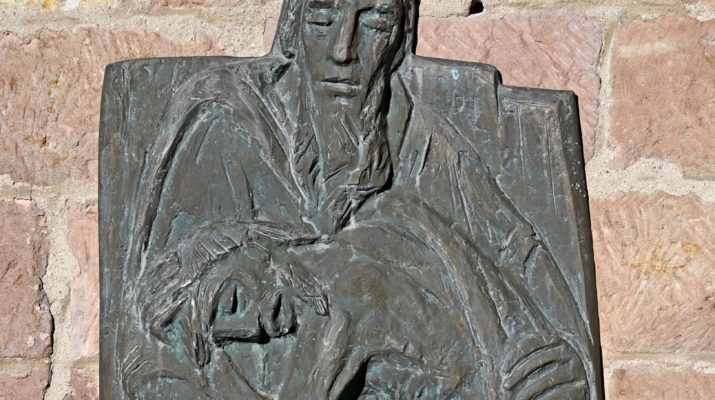Matthew 18:15-20
Proper 18A
BibleHub
15 “If your brotherI or sister sinsII against you, goIII
Notes on verse 15a
I “brother” = adelphos. From a (with, community, fellowship) + delphus (womb). This is a brother in a literal or figurative sense. It is also used of another member of the Church.
II “sins” = hamartano. From a (not) + meros (a part or share, portion); {from meiromai (to get one’s allotment or portion)}. This term also used of archers not hitting their targets. Literally, it means not getting your share or to miss the mark. Figuratively, it meant to do wrong or to sin.
III “go” = hupago. From hupo (by, under, under the authority of) + ago (lead, bring, guide, spend, drive, carry). This is to lead under so to depart, go away, or die. It is to lead away under the command of someone else, being given a mission or objective to carry out.
and point out the faultIV when the two of you are alone.V If you are listenedVI to, you have regainedVII that one.VIII
Notes on verse 15b
IV “point out the fault” = elegcho. 17x in NT. This is to expose, reprove, discipline, convict, or rebuke. It is using convincing evidence to expose a wrong.
V “alone” = monos. Perhaps from meno (to stay, abide, wait, endure). This is alone, single, remaining, mere, desolate.
VI “listened” = akouo. This is hear or listen, but it also means to understand by hearing. This is where the word “acoustics” comes from.
VII “regained” = kerdaino. 17x in NT. From kerdos (profit, gain, advantage). This is to gain, win, or acquire. It is a word from the sphere of bartering and trading. Figuratively, it can mean trading up.
VIII “one” = adelphos. Same as “brother” in v15. See note I above.
16 But if you are not listened to, takeIX oneX or twoXI others along with you, so that everyXII wordXIII
Notes on verse 16a
IX “take” = paralambano. From para (beside, by, in the presence of) + lambano (active acceptance/taking of what is available or what has been offered; emphasizes the choice and action of the individual). This is to receive, take, acknowledge, associate with. It can also mean to take on an office or to learn.
X “one” = heis. This is one, a person, only, some.
XI “two” = duo. This is two or both.
XII “every” = pas. This is all or every.
XIII “word” = rhema. From rheo (to speak, command, make, say, speak of); from ereo (to all, say, speak of, tell; denotes ongoing speech). This is word, which implies a matter or thing spoken, a command, report, promise, thing, or business. Often used for narration, commands, or disputes.
may be confirmedXIV by the evidenceXV of two or threeXVI witnesses.XVII
Notes on verse 16b
XIV “confirmed” = histemi. This is to stand, place, establish, appoint, stand ready, be steadfast.
XV “evidence” = stoma. Perhaps from tomoteros (sharp, keener); from temno (to cut). This is mouth, speech, language, the tip of a sword, an opening in the ground.
XVI “three” = treis. This is three.
XVII “witnesses” = martus. This is a witness whether having heard or seen something. It refers to a witness literally, judicially, or figuratively. By analogy, this is a martyr. This is also where the word “martyr” comes from.
17 If that person refuses to listenXVIII to them, tell it to the church,XIX and if the offender refuses to listen even to the church, let such a one be to you as a gentileXX and a tax collector.XXI
Notes on verse 17
XVIII “refuses to listen” = parakouo. Related to “listens” in v15. 3x in NT. From para (beside, by, in the presence of) + akouo (see note VI above). This is literally contrary hearing. So, it could be disobedience or inattention.
XIX “church” = ekklesia. From ek (from, out from) + kaleo (to call by name, invite, to name, bid, summon, call aloud) {related to keleuo (to command, order, direct); from kelomai (to urge on)}. This is properly a calling out or an assembly. It was used to refer to a church.
XX “gentile” = ethnikos. 4x in NT. From ethnos (people who are united by having similar customs or culture; a tribe, race, nation, or Gentiles in general); probably from etho (custom, culture). This is ethnic, national, foreign, or referring to a Gentile. This is the root that the word “ethnicity” comes from.
XXI “tax collector” = telones. From telos (an end, aim, purpose, completion, end goal, consummation, tax; going through the steps to complete a stage or phase and then moving on to the next one) + oneomai (to buy); {from onos (a price or sum)}. This is tax collector, one who worked for the Romans taking taxes from Jews. It also meant the toll house. Literally, this is “paying at the end.”
18 TrulyXXII I tellXXIII you, whatever you bindXXIV
Notes on verse 18a
XXII “truly” = amen. From Hebrew amen (verily, truly, amen, truth, so be it, faithfulness); from aman (to believe, endure, fulfill, confirm, support, be faithful, put one’s trust in, be steadfast. Figuratively, this is to be firm, steadfast, or faithful, trusting, believing, being permanent, morally solid). This word is literally firmness, but figuratively fidelity, faithfulness, honesty, responsibility, trust, truth, steadfastness. Properly, it is to be sure, certain, or firm. This is a word of emphasis indicating that something crucial follows.
XXIII “tell” = lego. This is to speak, say, name, call, command. It is generally to convey verbally.
XXIV “bind” = deo. To tie, bind, compel, put in chains. This is to bind in a literal or figurative sense. Can also mean declaring something unlawful.
on earthXXV will be bound in heaven,XXVI and whatever you looseXXVII on earth will be loosed in heaven.
Notes on verse 18b
XXV “earth” = ge. This is earth, land, soil, region, country, the inhabitants of an area.
XXVI “heaven” = ouranos. May be related to oros (mountain, hill); probably related to airo (raise, take up, lift, remove). This is the air, the sky, the atmosphere, and heaven. It is the sky that is visible and the spiritual heaven where God dwells. Heaven implies happiness, power, and eternity.
XXVII “loose” = luo. This is to loose, release, or untie. Figuratively, it can mean to break, destroy, or annul. This is releasing what had been withheld.
19 Again, truly I tell you, if two of you agreeXXVIII on earth about anythingXXIX you ask,XXX it will be doneXXXI for you by my FatherXXXII in heaven.
Notes on verse 19
XXVIII “agree” = sumphoneo. 6x in NT. From sumphonos (harmonious, agreeing, consent; having one voice i.e. a shared understanding); {from sun (with, together with) + phone (voice, sound, tone or noise; also a language or dialect); probably from phemi to declare, say, use contrasts in speaking to shed light on one point of view); {from phao (to shine) or phaino (to bring light, cause to appear, shine, become visible or clear)}}. This is to harmonize with, agree, have a shared opinion, an accord. This is the root that “symphony” comes from.
XXIX “anything” = pas + pragma. Pas is the same as “every” in v16. See note XII above. Pragma is 11x in NT. From prasso (to do or practice – something done on an on-going basis or by habit; to accomplish, attend, or commit). This is an action, matter, or business. It is something done on a regular basis that is done in order to get something done.
XXX “ask” = aiteo. This is to ask, demand, beg, desire.
XXXI “done” = ginomai. This is to come into being, to happen, become, be born. It can be to emerge from one state or condition to another or is coming into being with the sense of movement or growth.
XXXII “Father” = pater. This is father in a literal or figurative sense. Could be elder, senior, ancestor, originator, or patriarch.
20 For where two or three are gatheredXXXIII in my name,XXXIV I am there amongXXXV them.”
Notes on verse 20
XXXIII “gathered” = sunago. Related to “go” in v15. From sun (with, together with, closely associated) + ago (see note III above). This is to lead together and so to assemble, bring together, welcome with hospitality, or entertain. In the sense of assembly, this is the root of the word “synagogue.”
XXXIV “name” = onoma. May be from ginosko (know, recognize, learn from firsthand experience). This is a name, authority, cause, character, fame, reputation. The name was thought to include something of the essence of the person so it was not thought to be separate from the person.
XXXV “among” = mesos. Perhaps from meta (with among, behind, beyond; implies a change following contact or action). This is middle, among, center, midst.
Image credit: “Merciful Father/Lost Son” on the external wall of St. Apollinaris and Agatha in Scheven, Germany. Photo by Thomas Hummel, 2022.




